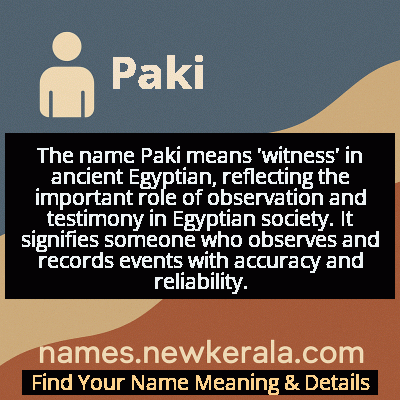Paki Name Meaning & Details
Origin, Popularity, Numerology Analysis & Name Meaning of Paki
Discover the origin, meaning, and cultural significance of the name PAKI. Delve into its historical roots and explore the lasting impact it has had on communities and traditions.
Name
Paki
Gender
Male
Origin
Egyptian
Lucky Number
1
Meaning of the Name - Paki
The name Paki means 'witness' in ancient Egyptian, reflecting the important role of observation and testimony in Egyptian society. It signifies someone who observes and records events with accuracy and reliability.
Paki - Complete Numerology Analysis
Your Numerology Number
Based on Pythagorean Numerology System
Ruling Planet
Sun
Positive Nature
Leaders, ambitious, highly driven, self-reliant, innovative.
Negative Traits
Overly aggressive, domineering, impatient, selfish.
Lucky Colours
Red, orange, gold.
Lucky Days
Sunday.
Lucky Stones
Ruby, garnet.
Harmony Numbers
2, 3, 9.
Best Suited Professions
Entrepreneurs, managers, engineers.
What People Like About You
Courage, determination, leadership.
Famous People Named Paki
Paki I
Ancient Egyptian Official
Royal scribe and administrator under Pharaoh Amenemhat II
Paki the Elder
Priest and Temple Administrator
High priest of Thoth at Hermopolis, credited with temple renovations
Paki of Thebes
Military Commander
Commander of chariot forces under Seti I, known for military campaigns
Paki the Scribe
Scholar and Physician
Author of medical papyri and astronomical texts
Name Variations & International Equivalents
Click on blue names to explore their detailed meanings. Gray names with will be available soon.
Cultural & Historical Significance
During the Middle and New Kingdoms, individuals named Paki often held positions of trust in royal administration, temple hierarchies, and military command. The name reflected the Egyptian emphasis on truth (ma'at) and the importance of reliable testimony in both earthly and divine matters. Many bearers of this name appear in tomb inscriptions and temple records, indicating their respected status in society and their role in preserving cultural and religious traditions through their witnessing function.
The name's significance extended beyond mere observation to encompass the Egyptian concept of eternal witness - the idea that one's deeds were constantly observed by the gods and would be judged in the afterlife. This gave the name profound spiritual dimensions, connecting earthly responsibility with divine accountability in the Egyptian worldview.
Extended Personality Analysis
Individuals named Paki are typically characterized by their keen observational skills and analytical mindset. They possess a natural inclination toward truth-seeking and accuracy, often serving as reliable sources of information and guidance in their communities. Their witnessing nature makes them particularly attentive to details that others might overlook, and they tend to have excellent memory retention for events and conversations. This makes them valuable in situations requiring careful documentation or precise recollection.
Socially, Pakis are often perceived as trustworthy and dependable individuals who value honesty and integrity above all else. They may exhibit a calm, measured demeanor, preferring to observe situations thoroughly before offering opinions or taking action. This thoughtful approach, combined with their strong sense of justice, often positions them as natural mediators or advisors. However, their commitment to truth can sometimes make them appear overly critical or detached when they feel compelled to correct inaccuracies or challenge popular misconceptions. Their observational nature gives them a unique perspective that balances intuition with factual analysis.
Modern Usage & Popularity
In contemporary times, the name Paki has seen limited usage outside of Egyptological circles and Egyptian Christian communities. While it maintains some traditional usage in Upper Egypt and among Coptic families preserving ancient naming traditions, its popularity has declined significantly. The name faces challenges in international contexts due to phonetic similarities with derogatory terms in some languages. However, there has been a recent resurgence of interest among Egyptian nationalists and historians seeking to revive authentic ancient Egyptian names. Modern bearers of the name are often from families with strong connections to Egyptian heritage or academic backgrounds in Egyptology. The name remains more common in rural areas of Egypt than in urban centers, and its usage is occasionally seen in artistic or literary contexts as a nod to Egypt's ancient past.
Symbolic & Spiritual Meanings
Symbolically, the name Paki represents the concept of conscious observation and the preservation of truth. It embodies the Egyptian philosophical ideal of being a 'keeper of records' both in the physical and spiritual realms. The name carries connotations of reliability, memory, and the transmission of knowledge across generations. In metaphorical terms, Paki symbolizes the human capacity to witness and document reality, serving as a bridge between past and present, and between the mundane and the divine. The name also reflects the ancient Egyptian belief in the importance of bearing witness to one's own life deeds, which would be judged in the afterlife. This symbolic meaning extends to modern interpretations where the name represents the enduring human quest for truth and understanding through careful observation and documentation of the world around us.

